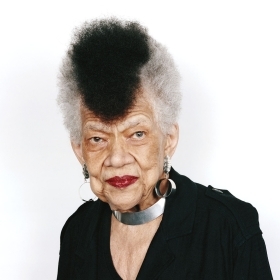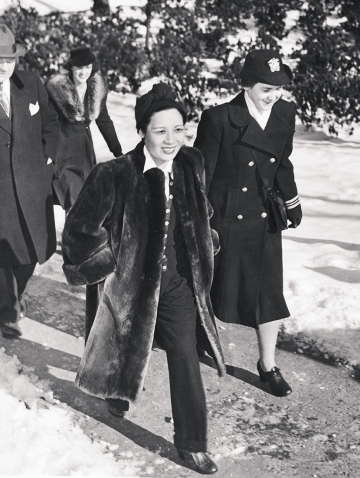Mayling Soong Chiang 1917 (Madame Chiang Kai-Shek) rocking slacks during a 1943 visit to campus. Wellesley President Mildred McAfee (rear) greeted her in her WAVES uniform.
Kudos
This magazine is something to be very proud of. Issues are exciting, informative, inspirational, and at times challenging.
The passions reflected in the letters to the editor demonstrate the powerful effects that your articles have on your readers. Congratulations!
Lucy Fowler Klug ’56, Baileys Harbor, Wis.
Wellesley Runs
Regarding “Wellesley Runs,” the cover story of the winter ’19 issue, via Twitter:
I cannot put into words what it feels like to be in this magazine. In 1998 when I walked on campus, I didn’t know it would change my life. My courage. My resiliency. My love for community. They were all nurtured on that campus. Thank you. We run. We win. We are women who will.
@lizforma (Rep. Liz Miranda ’02, Roxbury, Mass.)
The Republican Party
Republicans have recently been featured in the alumnae magazine (“Wellesley Runs,” winter ’19) and fund-raising appeals (the March 2019 mailing featuring the current president of the Wellesley College Republicans).
This is a disturbing development, because I would expect Wellesley to refrain from condoning today’s Republican party, which has pledged fealty to President Trump, lies incessantly, unrelentingly attacks the rule of law, and peddles in hateful rhetoric that seriously endangers vulnerable communities.
This treatment of Republicans as being simply on the other side of a political divide, or treating party affiliation as nothing more than a political disagreement, is dangerous. We do not currently have two parties that are interested in governing. The Republican party is seeking to dismantle, rather than run, our democracy, and should not be treated as anything other than intellectually dishonest and morally bankrupt. Wellesley—its history department especially—should take this threat seriously. It boggles the mind why Wellesley would see fit to celebrate any student or alumna’s affiliation with such flagrant racism and corruption.
These are not normal times. To pretend otherwise is to engage in willful ignorance. Wellesley taught us all better than that.
Maggie O’Grady ’04, Arlington, Mass.
LGBTQ+ Alums Need Visibility
I was crushed to open my new Wellesley magazine (winter ’19) to see a letter to the editor asking why it matters that the magazine would “note the sexual preference” of an alumna recognized by the Alumnae Achievement Awards. Why would you not? We don’t live in a world where people often get to celebrate being both accomplished and being LGBTQ+. As a queer alumna (and member of WAPA, the Wellesley Alum Pride Alliance), I’m overjoyed and uplifted when I see other LGBTQ+ alums celebrated for their work while their identities are celebrated as well. When I was a student, seeing other alums succeed and be out as LGBTQ+ told me I could be out and proud and succeed, too.
Reducing a meaningful and important part of a person’s identity to “a sexual preference” unfairly sexualizes LGBTQ+ identities, which contributes to the harmful idea that being LGBTQ+ is something inappropriate to discuss in public life, to discuss with children, to learn about in schools by teaching queer-inclusive history. Until our society allows LGBTQ+ folks to live without harassment and legalized discrimination, it’s critical that LGBTQ+ people can connect with each other and uplift each other by being out when we can be—and for well-meaning straight siblings to let us celebrate who we are, without implying we should put ourselves back in the closet for their comfort.
Liz Wright ’13, Boston, Mass.
The 1960s Pants Debate
As a ’72 alum who entered Wellesley in the banner year 1968, I read with amusement the recent letters about a requirement—or lack thereof—that students wear skirts to classes (Letters to the Editor, winter ’19; “1968: The Year Everything Changed,” fall ’18).
As I recall, the requirement was for skirts at dinner, where, after all, we were served by waitresses that first semester!
I rarely would have made it to class, especially at 8:40 a.m. in winter, had skirts been required. Having gained 10 pounds during my first months on campus, I put on the same pair of borrowed, baggy sweatpants almost every morning.
Miniskirts edged ever higher during 1969. Soon “powers that be” likely concluded that jeans were more modest and acceptable than skirts that left so little to the imagination. Thus, in my memory, ended “dressing for dinner.”
Kathy McCoy Berman ’72, Laconia, N.H.
No Skirts in Class
The remark that those of us in the class of ’66 “had to wear skirts to class” jumped out at me. No, we didn’t have to wear skirts to class—thank goodness (and one of the things I loved about Wellesley)—but yes, we were required to wear skirts to dinner. A small point, I know, in a fascinating article (“1968: The Year Everything Changed,” fall ’18).
Susan Forbes Martin ’66, Brookline, Mass.
Madame Chiang’s Pants
I noticed two letters to the editor (winter ’19) referring to the early wearing of pants at Wellesley, one dating the practice back to the days of Mayling Soong Chiang 1917 (Madame Chiang Kai-Shek) and her pants, which made me wonder about pants being worn any earlier. It’s not an important story, but if there are photos in the archives it might be fun to see those pants….
I was hired at my first job in journalism at the English language newspaper in Caracas mostly because the publisher had known Madame Chiang and hoped I had crossed paths with her. He was over 80 at the time and had his dates a little mixed up. The features writer before me had also gone to Wellesley, in my class!
Mary Carpenter ’72, Washington, D.C.
Editor’s Note: Madame Chiang in all her panted glory is shown above.
Kudos to Writing Moms
On a bitterly cold winter’s day, I sat down with my coffee to catch up on the fall ’18 issue of the magazine. What a treat it was! First I was delighted to learn that my Wellesley running buddy Jennifer Kegel ’88 was recently inducted into the Wellesley Athletics Hall of Fame (“Sports for Life,” fall ’18). Heartfelt congratulations, Jennifer! Thank you for including that information. I laughed out loud, and was also moved to tears, at two stories: “Home School” by Sarah Ligon ’03, and “First Steps” by Jamie Kiffel-Alceh ’98. Kudos to these brave mothers for their self-sacrifice, perseverance, and energy devoted to raising their children. You two are a beautiful example to the rest of us, and I am grateful that you shared your stories.
Beth Fields Weber ’88, Newark, Del.
Education in the “Screen Age”
Thank you for “Home School,” a wonderful article. Sarah’s children are very fortunate to have such an informed and capable parent, willing to step completely outside the education mainstream. It hit home especially because she mentions her positive experience with a Waldorf school. I homeschooled my older daughter for similar reasons nearly 30 years ago, then gave up in despair after a year and helped start a still-thriving Waldorf school in my town near Buffalo, N.Y. I’ve never ceased to marvel at the breadth and depth of the Waldorf approach, and at the capacities and open-heartedness of Waldorf graduates. American education is so fraught in the “screen age,” we sometimes forget the “how should one live?” question, which Sarah rightly calls the fundamental reason for studying anything!
Jane Poindexter Ried ’74, East Aurora, N.Y.




